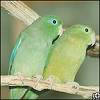Parrots call baby chicks by name: experts
Sunday, August 20 2006 @ 12:59 AM UTC
Contributed by: MikeSchindlinger
By IANS - Tuesday August 1, 09:23 AM
 Hamburg, Aug 1 (DPA) In a discovery that is likely to rekindle the debate about language in the animal kingdom, researchers in Germany have found that some parrots appear to give their offspring individual names.
Hamburg, Aug 1 (DPA) In a discovery that is likely to rekindle the debate about language in the animal kingdom, researchers in Germany have found that some parrots appear to give their offspring individual names.
Animal behavioural scientists at the University of Hamburg say that parrots use a distinctive call for each of their chicks, with no two chicks being given the same 'name' call.
The small South American parrots also apparently have name calls for their mates.
'The birds very definitely use a particular call exclusively with a particular bird and never for any other bird,' says Rolf Wanker, head of the Hamburg University Zoological Institute's behavioural research laboratory.
'What is not yet clear, however, is whether these calls can be equated with what we would call names such as Hans or Fritz or whether they could be more generic labels such as 'my baby' or 'my mate',' he adds.
The studies were inspired by observations in the spectacled parrotlet's natural habitat in Colombia. There, researchers noted that individual parrots seemed to respond to specific calls that other parrots in the same flock ignored.
'A mother bird had the uncanny ability to utter a cry that would result in her chick returning to the nest immediately amid the cacophony of the other parrots all around,' Wanker recalls.
'It was obvious that the baby knew it was being called,' he says.
At the laboratory here, studies showed that these name equivalents are fractional cries lasting between 90 and 120 milliseconds.
The cry is distinctive enough to provide acoustic clues as to the identity of the individual uttering the call and also to the identity of the intended recipient bird.
'A mother bird uses a different call for her baby from the one she uses for her mate, and they respond with calls that correspondent to her identity,' he says.
Similar findings have been achieved with certain primates and with dolphins. Many years ago, British TV science producer David Attenborough showed that macaque monkeys use distinctive alarm calls to alert other monkeys to danger.
Macaques will use one call to identify a panther, thus telling other monkeys to climb up a tree. But they will use a different call to identify a python, thus ensuring that all the monkeys climb down a tree that has a snake lurking in its branches.
Other studies have determined that birds develop regional 'accents' and 'dialects' depending on their location. Sparrows in the eastern US are known to have subtly different chirps from their cousins on the west coast.
The German findings are the first involving parrots. The spectacled parrotlet is among the smallest parrots, only slightly larger than budgerigars. The bright green birds with a distinctive yellow ring around their eyes live in eastern Panama and northern Colombia.
In the study, parent birds and their chicks were placed in separate cages within earshot of each other but out of view of each other.
The birds' calls to each other were recorded and later played back to the individual birds to ascertain their response. The findings demonstrated that each bird used name-specific calls.
Wanker shies away from calling this labelling behaviour any form of language, noting that it has yet to be proved conclusively whether humans are the only animals capable of abstract linguistic structures.
'Parrots are unique among avians,' he says. 'They are the primates of the avian world and are very highly developed creatures with complex social systems and prodigious cognitive skills.'
http://in.news.yahoo.com/060801/43/66bij.html
0 comments
http://www.freeparrots.net/article.php?story=20060820005922175
 Hamburg, Aug 1 (DPA) In a discovery that is likely to rekindle the debate about language in the animal kingdom, researchers in Germany have found that some parrots appear to give their offspring individual names.
Hamburg, Aug 1 (DPA) In a discovery that is likely to rekindle the debate about language in the animal kingdom, researchers in Germany have found that some parrots appear to give their offspring individual names.